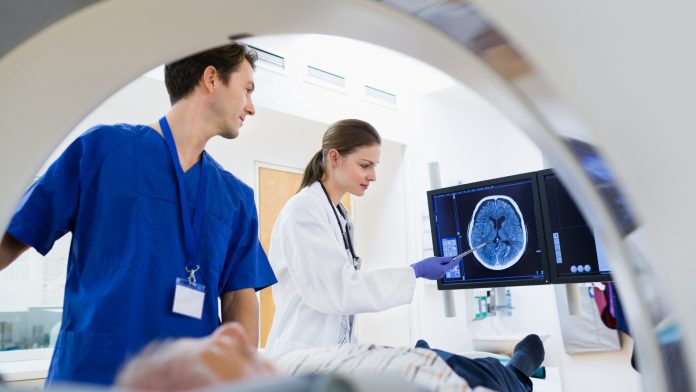
Ultra-powerful 7T MRI scanners could revolutionise treatment for cognitive impairment in Parkinson’s patients.
Parkinson’s disease is a brain disorder characterised by symptoms such as shaking, stiffness and cognitive impairment. New analysis finds that powerful MRI scanners could be used as part of treatment for cognitive impairment in Parkinson’s and a related disorder, progressive supranuclear palsy (PSP).
To understand cognitive impairment in Parkinson’s, researchers from the University of Cambridge used an ultra-high-strength MRI scanner at the Wolfson Brain Imaging Centre to measure brain changes in patients with Parkinson’s.
The results are published in the journal Movement Disorders.
Cognitive impairment in Parkinson’s
Parkinson’s is often treated with drugs that compensate for the loss of dopamine, but these treatments do not improve the non-motor symptoms such as cognitive decline. Scientists have explored targeted therapies for cognitive impairment in Parkinson’s patients and found that noradrenaline is beneficial.
Professor James Rowe from the Department of Clinical Neurosciences at the University of Cambridge, who led the study, said: “Noradrenaline is very important for brain function. All of our brain’s supply comes from a tiny region at the back of the brain called the locus coeruleus – which means ‘the blue spot’.”
A 2021 study by Professor Rowe examined donated brains and found some people with PSP had lost as much as 90% of the noradrenaline-producing locus coeruleus.
This discovery was a driving force behind using ultra-powerful 7T MRI scanners to check for cognitive impairment in Parkinson’s. 7T scanners can provide resolution at the size of a grain of sand.
“The locus coeruleus is a devil to see on a normal scanner,” said Professor Rowe. “Even good hospital scanners just can’t see it very well. And if you can’t measure it, you can’t work out how two people differ: who’s got more, who’s got less? We’ve wanted MRI scanners to be good enough to do this for some time.”
The innovative technology encompassed in the ultra-powerful 7T MRI scanner allowed insightful examination of the locus coeruleus of their subjects. Data confirm that the greater level of damage to this region leads to more severe symptoms of apathy and diminished levels of cognitive impairment in Parkinson’s patients.
New hope for innovating therapeutics
The discoveries could lead to new treatments for cognitive impairment in Parkinson’s. Several drugs targeting noradrenaline have been through clinical trials for other conditions and are safe. Professor Rowe and colleagues are leading a clinical trial at Cambridge University Hospitals NHS Foundation Trust to see if these drugs alleviate symptoms in PSP.
Dr Rong Ye from the Department of Clinical Neurosciences at the University of Cambridge, the study’s joint first author, said: “Not every PSP or Parkinson’s patient is going to benefit from noradrenaline-boosting drugs. They’re more likely to benefit those people with damage to their locus coeruleus – and the greater the damage, the more benefit they’re likely to see.
“The ultra-powerful 7T scanner may help us identify those patients who we think will benefit the most. This will be important for the success of the clinical trial, and, if the drugs are effective, will mean we know which patients to give the treatment to. In the long term, this will prove more cost-effective than giving noradrenaline boosters to patients who ultimately would see no benefit.”









